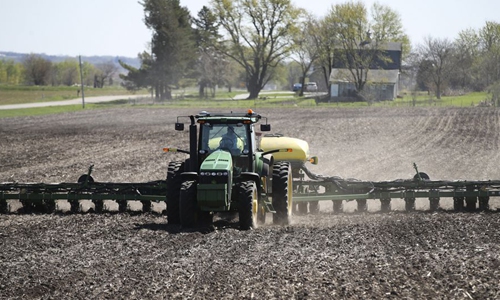Business insiders believe China-US trade deal to bring opportunities for American soy industry
Source:Xinhua Published: 2020/4/17 16:08:29

Grant Kimberley, a sixth-generation soybean farmer and marketing director of the Iowa Soybean Association, operates a seeding machine at his family farm in Maxwell, Iowa, the United States, April 26, 2019. (Xinhua/Wang Ying)
The sustainable and growing relationships between American soybean farmers and international customers would ensure growth of soy industry, business insiders said, adding the phase-one economic and trade agreement between China and the United States provides opportunities for growers and traders.
Over 2,000 global customers from nearly 100 countries and regions heard from industry representatives, stakeholders, and U.S. soybean farmers at a two-day online forum organized by U.S. Soybean Export Council (USSEC), which concluded on Wednesday.
The U.S. soybean industry showed it remained optimistic that the country could provide supplies to world market, and China would uphold its end of the phase-one trade deal this year despite a slight delay due to the COVID-19.
Jim Sutter, CEO of USSEC, was quoted by a press release issued by the group as saying that planting season is moving forward, and U.S. export capacity can meet the safety and quality expectation from global customers.
"As we continue to navigate these unprecedented times, it's more important than ever that we demonstrate to current and potential international customers the strength of our farmers and benefits of buying U.S. soy," said Sutter. "USSEC has quickly adapted and changed tactics so we can show customers that our entire supply chain is working to ensure a sustainably and safely produced, reliable supply of soy for global customers."
"Spring is planting season and as farmers, we have a responsibility to continue our job no matter what obstacles we face," said Monte Peterson, chairman of USSEC and board member of the American Soybean Association, echoed at the webinar.
Phillips Richard, representative of the Los Angeles-based U.S.-China Agricultural Trade Service Center (ATSC), predicted that the trade of agricultural products, including soybeans, between the U.S. and China would resume to normal and two sides would continue to cooperate to achieve win-win cooperation after two countries successfully reached phase-one economic and trade agreement this January.
"Unexpectedly, this COVID-19 sudden outbreak, and as a result of the backlog of import and export containers at ports, the slowdown in logistics, and the forced delay of order contracts, the overall situation is undoubtedly no good," he said. "However, no matter what difficulties China-U.S. trade encounters, we firmly believe that as long as the two countries continue to cooperate, they will give the people well-being."
"At least American farmers think so," Richard added.
Many members of the ATSC service center are from China and their annual imports exceed 1 billion U.S. dollars.
While the deal probably will not be fulfilled this marketing year, Sutter said USSEC believed it would be "heavily done" in the second half of the 2020 calendar year. ■
RELATED ARTICLES:
Posted in: ECONOMY